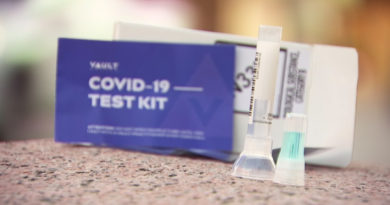What’s next for Marlins after COVID-19 outbreak? MLB commissioner Rob Manfred says they could play Wednesday
Although the regular season is less than a week old, Major League Baseball is already dealing with a coronavirus outbreak. The Miami Marlins have now had at least 17 test positive since Opening Day among players and coaches. Four players tested positive over the weekend, an additional seven on Monday, and then four more on Tuesday.
The outbreak predicament forced the league to postpone two games scheduled for Monday night: Miami’s home opener versus the Baltimore Orioles, and the series-opening game between the New York Yankees and the Philadelphia Phillies, who hosted the Marlins over the weekend. The Phillies and Yankees have since had their Tuesday night game postponed.
Commissioner Rob Manfred said. However, they could return to the field as soon as Wednesday with “acceptable” testing results. It’s unclear what Manfred considered “acceptable.”
Manfred conducted a call with the 30 franchise owners on Monday afternoon, and there are no plans to cancel the season or pause for a couple of weeks. Instead, MLB is intent on moving forward, and plugging along through a 60-game season. The league moved forward with a 10-game slate on Monday.
Whether or not MLB can get to the postseason — and the fat TV checks that come with it — at this point in the year is anyone’s guess, and hinges in part on what the league does with the Marlins over the coming days.
How did the Marlins get here?
The Marlins first had a positive test result on Opening Day, when Jorge Alfaro was placed on the injured list shortly before the team’s season opener in Philadelphia. Here’s a timeline of what happened between then and Monday.
Friday, July 24 (Opening Day vs. Philadelphia)
- Alfaro tests positive and misses opener. No other Marlins have positive results.
Sunday, July 26
- Three other players, including scheduled starter Jose Urena reportedly test positive. Urena is scratched from his Sunday start. The rest of the team learns about the positive tests, but decides to play Sunday’s game as scheduled.
- The Marlins do not travel home as scheduled after winning the series finale at Citizens Bank Park. Instead, the team stays in Philly and awaits another round of test results.
Monday, July 27
- Another round of testing shows a full-blown outbreak for the Marlins. Eleven players test positive for COVID-19, and reportedly at least 14 total team members are positive.
- MLB postpones the Marlins’ Monday night home opener vs. the Orioles in Miami, and the team stays quarantined in Philadelphia.
Tuesday, July 28
- Four more players tested positive.
- The Marlins remain quarantined in Philadelphia.
- One player who previously tested positive now tested negative, per Ken Rosenthal.
Will the Marlins still face the Orioles?
The Marlins had four games scheduled against the O’s this week: two in Miami on Monday and Tuesday; and two in Baltimore on Wednesday and Thursday.
Manfred confirmed Tuesday’s game will also be postponed, but the Marlins could be back on the field at Camden Yards in Baltimore on Wednesday.
“We’re doing some additional testing,” Manfred said. “If the testing results are acceptable, the Marins will resume play in Baltimore on Wednesday against the Orioles.
The new positive tests cast more doubt on that possibility.
If the Marlins play this week, they will likely be joined by reinforcements in the form of alternative-site players up from Jupiter, Florida to face the Orioles.
While that seems like MLB’s preferred approach, it doesn’t appear to be the best approach — not when “best” is defined as the one safest for the players and staff members, or the one likeliest to allow MLB to keep the season afloat for a while longer.
Dr. Zachary Binney, an epidemiologist at Oxford College of Emory University, told Insider.com’s Scott Davis that the league should conduct an investigation to discover how the Marlins outbreak occurred so that it can reinforce its policies. “Was there some risky behavior from players who, say, went out to a bar or nightclub?” Binney asked. “Is that where this started, or was the spread mostly occurring at the Marlins facility, in the dugout or in the clubhouse? And if so, where did MLB’s protocols either break down or where were they too weak to begin with, and how can we improve the situation?”
What about this weekend?
The “vast majority” of Nationals players have voted against traveling to Miami for a three-game series this coming weekend. This comes one day after Nationals manager Dave Martinez admitted, “I’m scared. I really am.” The final decision ultimately lies with MLB, but, if commissioner Rob Manfred is serious about safety being the No. 1 concern, it’s hard to think he would sent the Nationals to Miami.
The obvious alternative to Miami would be playing the series at Nationals Park with the Marlins serving as the “home” team. The Marlins will be in Baltimore this week, so it would be a quick trip, and the Nationals are already set to be the “road” team against the Blue Jays at Nationals Park on Wednesday and Thursday. The Blue Jays will play two “home” series on the road as their Triple-A ballpark in Buffalo undergoes upgrades.
How long will the Marlins (or Phillies) quarantine?
Dr. Binney also said he would advise MLB to quarantine the Marlins for two weeks, and to do the same for the Phillies for five days, with test results dictating if that period was extended or not.
The reasoning is straightforward: COVID-19’s incubation period can vary from between two to 14 days, according to the Center for Disease Control. Harvard Medical School estimates that there’s a 40 percent chance of a negative test if you’re tested four days after being exposed to the virus. It’s possible that a player could test negative before later testing positive, by which point they would have potentially infected others.
In the Marlins’ case, another outbreak in a few days could completely compromise the other half of the team.
That’s just focusing on the Marlins themselves. It ignores that the Marlins could have infected the hotel staff, bus drivers, clubhouse attendants, and others in recent days, contributing to the community spread in Philadelphia before potentially doing the same in Baltimore and elsewhere. (Maybe it’s no wonder why Pittsburgh wasn’t on board with welcoming the Blue Jays.)
Did the Marlins expose anyone else?
It’s also possible that the Marlins could have infected Phillies players, continuing a chain that might have preceded that series. Cross-team transmission seems unlikely if the players’ only interaction with each other is on the field — the highest-risk activities have been found to involve prolonged exposure to large crowds in enclosed or poorly ventilated areas at intimate distances; none of which, for the most part, would seem to come into play during a baseball game.
Still, it makes for an unnerving coincidence, at minimum, that the Marlins played an exhibition game (that included a rain delay) against the Atlanta Braves before traveling to Philadelphia, and that the Braves have been without their top two catchers since due to COVID-like symptoms. Both Travis d’Arnaud and Tyler Flowers have tested negative so far, and there’s yet to be evidence that the Marlins infected any Phillies.
Even without that team-to-team transmission, it’s easy to see how MLB could have a bigger outbreak on its hands, within the Marlins or some other organization, if it doesn’t proceed with caution. Perhaps that’s why Dr. Arthur Morris, a professor of infectious diseases at the University of Toronto, told Rob Gillies of the Associated Press that, “anyone who knows anything about this problem and infectious disease epidemiology could have anticipated this. This plan was designed to fail and they went through with it anyways.”




